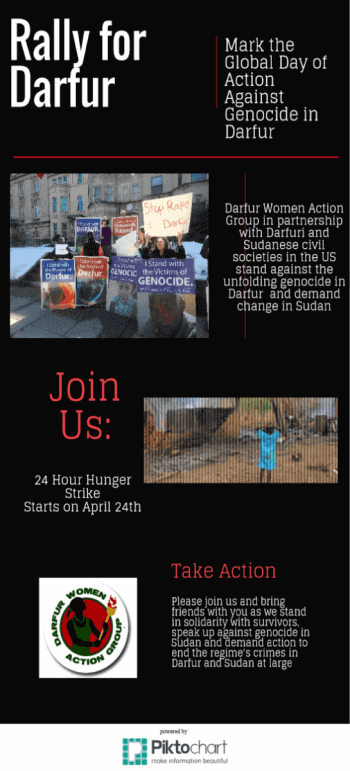Stand up for Refugees of Darfur’s Forgotten Genocide
Washington, D.C. – As the international community prepares to mark World Refugee Day on June 20, 2015, Darfur Women Action Group (DWAG) seeks to direct the world’s attention to the dire conditions Darfuri refugees face around the world. According to a UN report, one in every 122 people in the world is a refugee. This troubling figure is what motivates us to speak up on behalf of the Darfuri people who have been brushed aside by the international media and who continue to suffer the ramifications of genocide.
The genocidal campaign in Sudan’s remote region has forced millions from their homes. Nearly one million people have crossed the border into neighboring countries, seeking a safe refuge from the genocidal bloodshed. An estimated 377,000 reside in Chad alone. In addition to the country’s socio-economic instability, Chad is hardly hospitable given the Sahel’s harsh climate. More worrying however is insecurity, coupled with the scarcity of resources, resulting in refugees and locals competing over limited food and electricity. Such feuding has the potential to lead to more violence and aggravate the humanitarian disaster refugees face. Moreover, an uncounted number of refugees have fled to Egypt, Jordan, the Central African Republic (CAR), Libya, South Sudan, Ghana and Syria, where many continue to live without recognition by the UNHCR. In many cases, host countries have been mired in conflict, as is the case in the CAR, South Sudan, Syria and Libya, ultimately leaving refugees stuck in another war zone.
Some refugees have lived for over a decade without the means to support their basic needs. For instance, Darfuri refugees in Jordan not only lack meaningful support from UN agencies, but are also barred from seeking employment. If discovered working, they are jailed by the Jordanian authorities and subsequently deported back to Sudan, where they face further persecution they once thought to have left behind. Finally, the refugee crisis has literally torn families apart. Because men and boys are primarily targeted for killing and kidnapping, women constitute the overwhelming majority of those who become displaced. Women and children flee with minimal means of subsistence. Furthermore, Darfuri refugees living in South Sudan have yet to be recognized as such by the UNHCR, leaving them vulnerable to a host of problems without any legal recourse to seek aid and protection.
We recognize the tireless efforts made by the UNHCR and many Western governments, including the United States in particular, to process, receive and provide protection to refugees. Nonetheless, these efforts have been limited in scope, and as a result refugees are unable to adequately integrate themselves in their new societies given the trauma years of repression has inflicted. Furthermore, countless refugees remain in transit countries for prolonged periods and are confined to a constant state of legal and socioeconomic precarity.
The impact of war has yielded more than physical harm, with many refugees suffering grave emotional and social repercussions that include but are not limited to: psychological trauma, cessation of academic study, family disintegration, social exclusion, exploitation and human trafficking, violence against women and child labor.
Our call:
In light of the widespread humanitarian crisis affecting Darfuri refugees, DWAG urges the following:
– The international community must redouble its efforts to provide protection to refugees persons as warranted by international humanitarian law. Political and economic assistance to countries that absorb vast amounts of refugees must be made on the condition that host countries guarantee legal and socioeconomic protections to displaced persons so that they have the opportunity to lead dignified lives.
– UNHCR must develop effective mechanisms to reduce the arduous process refugees and asylum seekers face when asking for legal status and recognition.
– International organizations working on refugee resettlement must incorporate a culturally competent approach to dealing with refugees who have suffered genocidal policies.
– Legal aid is urgently needed to assist refugees subject to arbitrary arrest and other threats.
We recognize the work done by international NGOs in responding to the needs of Darfuri refugees, yet there remains a profound misunderstanding of the calamity’s magnitude. We call on the US government and other international actors, particularly UN agencies, to develop enhanced services to refugees affected by genocide. Providing them with legal protections, counseling and socioeconomic assistance will allow refugees to lead a meaningful life. Nevertheless, binding solutions must be found to halt the unrestrained flight of Darfuris from their homeland.
About us
Darfur Women Action Group (DWAG) is a U.S. based Darfuri women led anti-atrocities organization that works with victims and survivors of the Darfur genocide, both within the diaspora and back home in Sudan. We provide them with the means to address human rights abuses in their society and work with others to promote accountability and justice.
To support our work please visit: Donate





